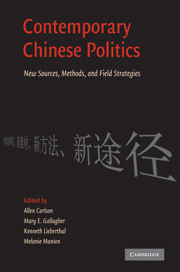Book contents
- Frontmatter
- Contents
- Tables and Figures
- Contributors
- Abbreviations
- Introduction
- Part I Sources
- Part II Qualitative Methods
- 7 The Worm’s-Eye View
- 8 More Than an Interview, Less Than Sedaka
- 9 Cases, Questions, and Comparison in Research on Contemporary Chinese Politics
- Part III Survey Methods
- Reflections on the Evolution of the China Field in Political Science
- Glossary
- References
- Index
9 - Cases, Questions, and Comparison in Research on Contemporary Chinese Politics
Published online by Cambridge University Press: 05 June 2012
- Frontmatter
- Contents
- Tables and Figures
- Contributors
- Abbreviations
- Introduction
- Part I Sources
- Part II Qualitative Methods
- 7 The Worm’s-Eye View
- 8 More Than an Interview, Less Than Sedaka
- 9 Cases, Questions, and Comparison in Research on Contemporary Chinese Politics
- Part III Survey Methods
- Reflections on the Evolution of the China Field in Political Science
- Glossary
- References
- Index
Summary
Not that long ago the opportunity to conduct fieldwork in the People’s Republic was greeted with an uneasy combination of euphoric enthusiasm and considered skepticism by political scientists. Well into the 1980s, scholars seriously debated the merits of fieldwork on the mainland versus research conducted exclusively in Hong Kong, Taiwan, or abroad (Thurston, 1983). From the beginning, fieldwork on the ground in China was a touchy political subject and researchers’ concerns continue to center on gaining access, ensuring the safety of interviewees and collaborators, and the political impact of their findings inside and outside China.
Frequently left aside, however, are questions of how to choose fieldwork sites and what impacts one’s choice of locale or locales have on research designs and outcomes. One recent exception is Maria Heimer’s thoughtful essay in support of what she terms a “one-case multi-field-site approach” to fieldwork research design, in which she argues that “authors can gain a deeper knowledge of one phenomenon by probing for similarities, while downplaying variations across place” and emphasizes that “this research design is different from, say, going to four field sites and treating them as four different cases of one phenomenon … and looking for variations between the four cases” (Heimer, 2006: 62, 69).
- Type
- Chapter
- Information
- Contemporary Chinese PoliticsNew Sources, Methods, and Field Strategies, pp. 162 - 178Publisher: Cambridge University PressPrint publication year: 2010
- 6
- Cited by



